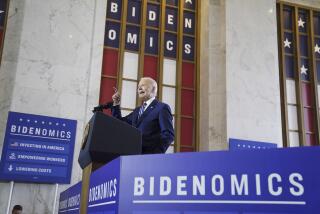Clinton Selling Sunny Assessment of Nation : Politics: President’s new upbeat outlook comes a few weeks after he said country was ‘in a funk.’ Analysts warn he could find himself in league with George Bush.
WASHINGTON — After lamenting America’s deep-rooted ailments for most of his term, President Clinton is suddenly sounding a new theme: That the nation’s social problems are on the mend and its economy is on the move.
In speeches this month--including one on Monday--Clinton has been declaring that America is “on a roll” and undergoing a rebirth of values.
“Americans are getting together around the values that make life worth living,” he told a tourism industry group at the White House. “Our country is moving in the right direction and coming back together. . . . We have a reassertion of basic values in every community.”
To sustain his argument, Clinton cited a battery of statistics: falling crime, poverty and teen-age pregnancy rates, increased employment and homeownership.
“There is a real reawakening today,” Clinton told a Dallas fund-raiser two weeks ago.
This relentlessly upbeat assessment is clearly aimed, in part, at winning greater support for a record that the White House feels is still underappreciated one year from the election. And Clinton’s positive spin on the economy’s performance fits the pattern of almost every incumbent.
But at a time when polling shows that most Americans believe the country to be on the wrong track, Clinton is likely to have a hard time selling his sunny assessment of the social condition to average Americans.
And some political analysts said that, in his newfound cheerfulness, Clinton is running the risk of becoming like then-President George Bush, who in 1992 told a grumpy public that America’s prospects were good--and was dismissed as being out of touch.
Analysts said that Clinton’s arguments for a return to basic values are built on a thin basis of fact.
The welfare rolls, poverty rates and food stamp rolls are down, but most analysts ascribe that to the economic cycle. Teen-age pregnancy is down, but only for one year, which doesn’t establish a trend.
*
Analysts think that the crime rate has fallen largely because of demographics: There are fewer youths and young men of crime-prone age. And most predict that crime rates will soon begin to rise again as the number of young men in that age group increases.
“There’s a long-term trend that these statistics don’t get at,” said one ranking expert on social welfare issues, who asked not to be quoted as criticizing the Administration. “The long-term trends are still quite discouraging, and you can’t really argue that all these problems will evaporate.”
Clinton offered no other evidence for his assertion that the nation is moving back to basic values. During his term, he has spoken frequently about the threats posed to the social fabric from such deep-seated problems as illegitimacy, broken homes and excessive violence on television and in movies.
Only last month, Clinton declared in an interview that the nation was “in a funk” that had average Americans feeling as if they were “lost in a fun house.” Two days later, after commentators compared his comments to President Jimmy Carter’s disastrous “malaise” speech, Clinton insisted that he did not take such a pessimistic view.
A funk, he said, is “something you can bounce out of.” And he said that he intended to shake Americans from their dark mood.
At the regular White House briefing Monday, Press Secretary Mike McCurry was asked how Clinton could assert that the country was “on a roll” when only a month earlier it was in a funk.
*
“We’re on a roll and the President is optimistic,” McCurry replied.
In his remarks Monday, Clinton also hailed “a dramatic reform” in government’s size and efficiency. He was upbeat even about the pending budget fight: “The good news is, leaders of both parties want to finish the job.”
Stuart Rothenberg, a nonpartisan political analyst in Washington, said that he had been struck by Clinton’s new approach but regarded it as “dangerous.”
He said that at a time of intense debate over racism, crime, social breakup and even the “cultural pollution” of daytime TV talk shows, ‘the public doesn’t think the country’s turned around. . . . This is the famous Bush problem--and it destroyed that incumbent’s reelection chances.”
But Alan Secrest, a Democratic consultant, said that as an incumbent in a time of a general voter unhappiness Clinton needs to build a case that he has brought fundamental change to the status quo.
“He’s got to get out in front of this parade, and distancing himself from the congressional Democrats probably won’t be sufficient,” Secrest said. He called Clinton’s new theme a sign that the reelection campaign has entered “Phase Two.”
More to Read
Get the L.A. Times Politics newsletter
Deeply reported insights into legislation, politics and policy from Sacramento, Washington and beyond. In your inbox three times per week.
You may occasionally receive promotional content from the Los Angeles Times.











